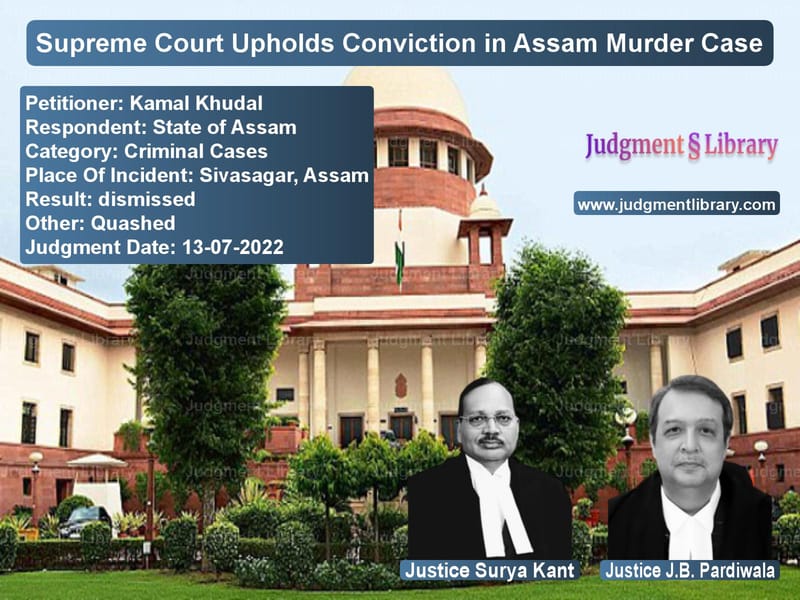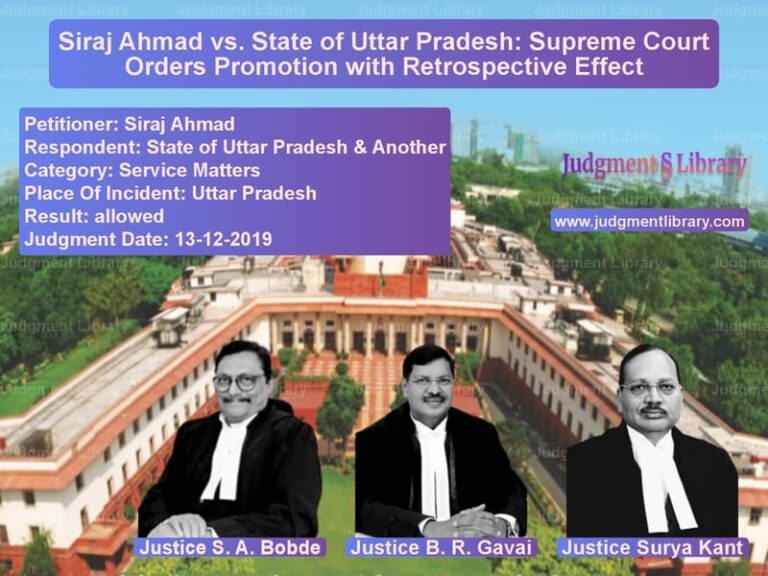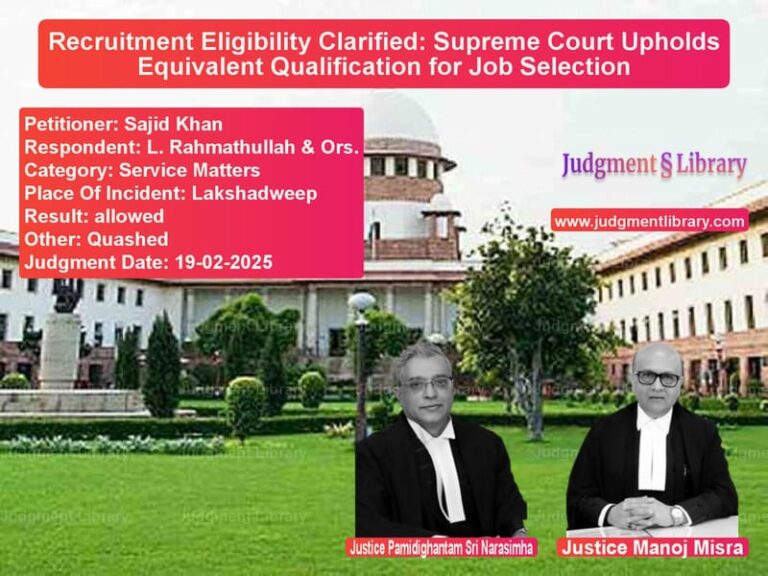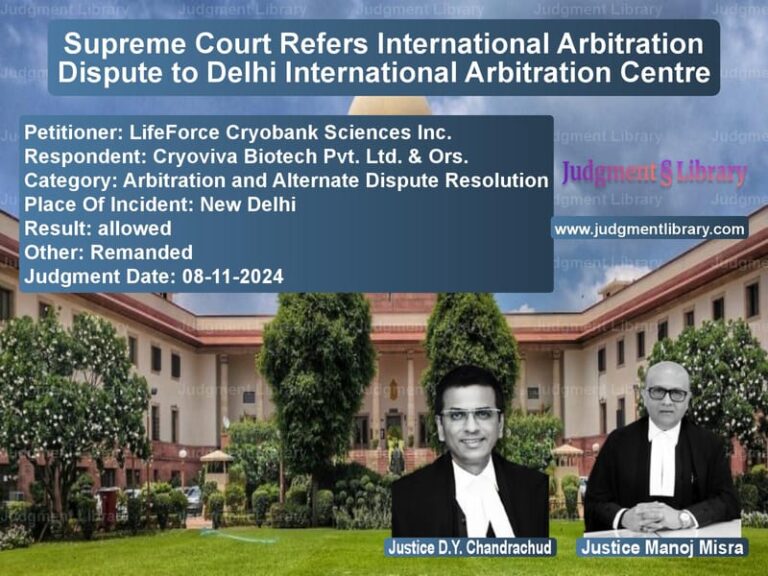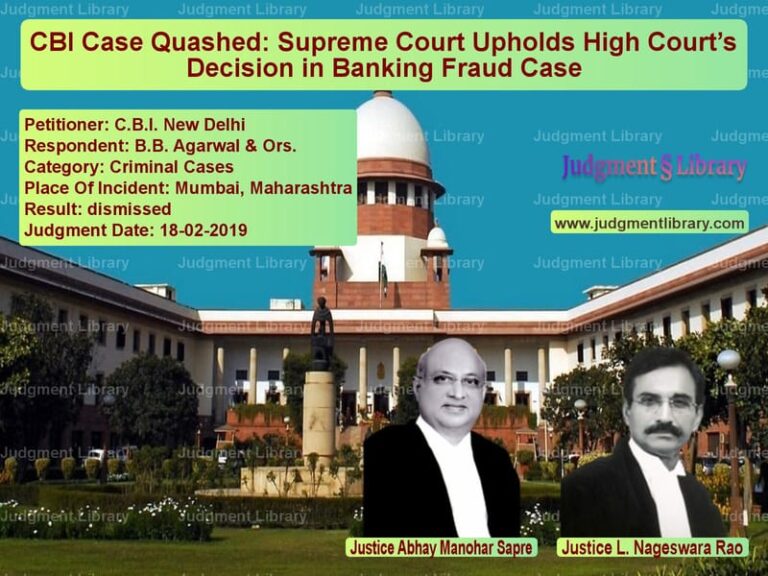Supreme Court Upholds Conviction in Assam Murder Case
The Supreme Court of India recently delivered its judgment in the case of Kamal Khudal vs. State of Assam, upholding the conviction of the appellant for murder under Section 302 of the Indian Penal Code (IPC). The court dismissed the appeal against the Gauhati High Court’s decision, which had affirmed the conviction imposed by the Additional Sessions Judge, Sivasagar.
Background of the Case
The case dates back to 15th July 2007 when Uttam Dutta, the deceased, was taken by the accused, Kamal Khudal, and his co-accused, Munna Bhoi, ostensibly for work related to paddy plantation. When the deceased failed to return home, his family members initiated a search and discovered his dead body in a drain at the Duribam Tea Estate with severe injuries, including burns.
The deceased’s brother, Utpal Dutta, lodged a First Information Report (FIR) at Kakatibari Police Station, leading to the arrest of three accused individuals. Following a trial, the Sessions Court convicted the appellant and one co-accused, sentencing them to life imprisonment. The third accused was acquitted due to a lack of evidence. The High Court upheld this decision, prompting the present appeal before the Supreme Court.
Petitioner’s Arguments (Kamal Khudal)
The appellant, through his legal counsel, argued:
- The conviction was primarily based on an oral dying declaration, which is a weak form of evidence.
- The alleged dying declaration made before prosecution witness PW-2, Hanu Khetrapal, lacked corroboration and should not have been relied upon.
- The prosecution failed to establish a clear motive for the alleged murder.
- The case was based on circumstantial evidence, and there was no direct proof of the accused committing the crime.
- The accused was last seen with the deceased, but this alone was insufficient to establish guilt beyond a reasonable doubt.
Respondent’s Arguments (State of Assam)
The prosecution countered these arguments, stating:
- The deceased explicitly named the accused in an oral dying declaration, which was heard by a reliable witness.
- The medical evidence corroborated the cause of death as due to burn injuries inflicted by the accused.
- The accused was absconding after the incident, which indicated guilt.
- The evidence, when viewed holistically, established the accused’s involvement beyond a reasonable doubt.
Supreme Court’s Observations
The Supreme Court analyzed the case and made key observations:
- An oral dying declaration, if found reliable, is admissible and can be the sole basis for conviction.
- The testimony of PW-2, who heard the deceased naming the accused, was found to be credible.
- The medical report supported the prosecution’s claim that the injuries were inflicted intentionally.
- The accused’s absconding after the incident was an incriminating circumstance.
- The courts below had rightly appreciated the evidence and found no reason to interfere with their findings.
Key Legal Precedents Considered
The Supreme Court relied on several legal precedents:
- Heikrujam Chaoba Singh v. State of Manipur (1999): Established that oral dying declarations, if reliable, can form the sole basis for conviction.
- Sharad Birdhichand Sarda v. State of Maharashtra (1984): Set guidelines for the admissibility of circumstantial evidence in criminal cases.
- State of Rajasthan v. Kashi Ram (2006): Highlighted the evidentiary value of an accused absconding as an incriminating factor.
Final Judgment
The Supreme Court ruled:
- The appeal was dismissed.
- The conviction and life sentence imposed by the trial court and upheld by the High Court were affirmed.
- The accused’s plea for acquittal lacked merit based on the evidence presented.
Implications of the Ruling
This judgment sets important legal precedents:
- Oral dying declarations can be relied upon if found credible.
- Last seen evidence, when combined with corroborative material, can establish guilt.
- Medical evidence plays a crucial role in corroborating dying declarations.
- Absconding after a crime can be taken as an additional piece of evidence against the accused.
The ruling reaffirms the evidentiary principles governing dying declarations and circumstantial evidence, strengthening the legal framework for criminal jurisprudence in India.
Petitioner Name: Kamal Khudal.Respondent Name: State of Assam.Judgment By: Justice Surya Kant, Justice J.B. Pardiwala.Place Of Incident: Sivasagar, Assam.Judgment Date: 13-07-2022.
Don’t miss out on the full details! Download the complete judgment in PDF format below and gain valuable insights instantly!
Download Judgment: kamal-khudal-vs-state-of-assam-supreme-court-of-india-judgment-dated-13-07-2022.pdf
Directly Download Judgment: Directly download this Judgment
See all petitions in Murder Cases
See all petitions in Bail and Anticipatory Bail
See all petitions in Judgment by Surya Kant
See all petitions in Judgment by J.B. Pardiwala
See all petitions in dismissed
See all petitions in Quashed
See all petitions in supreme court of India judgments July 2022
See all petitions in 2022 judgments
See all posts in Criminal Cases Category
See all allowed petitions in Criminal Cases Category
See all Dismissed petitions in Criminal Cases Category
See all partially allowed petitions in Criminal Cases Category

